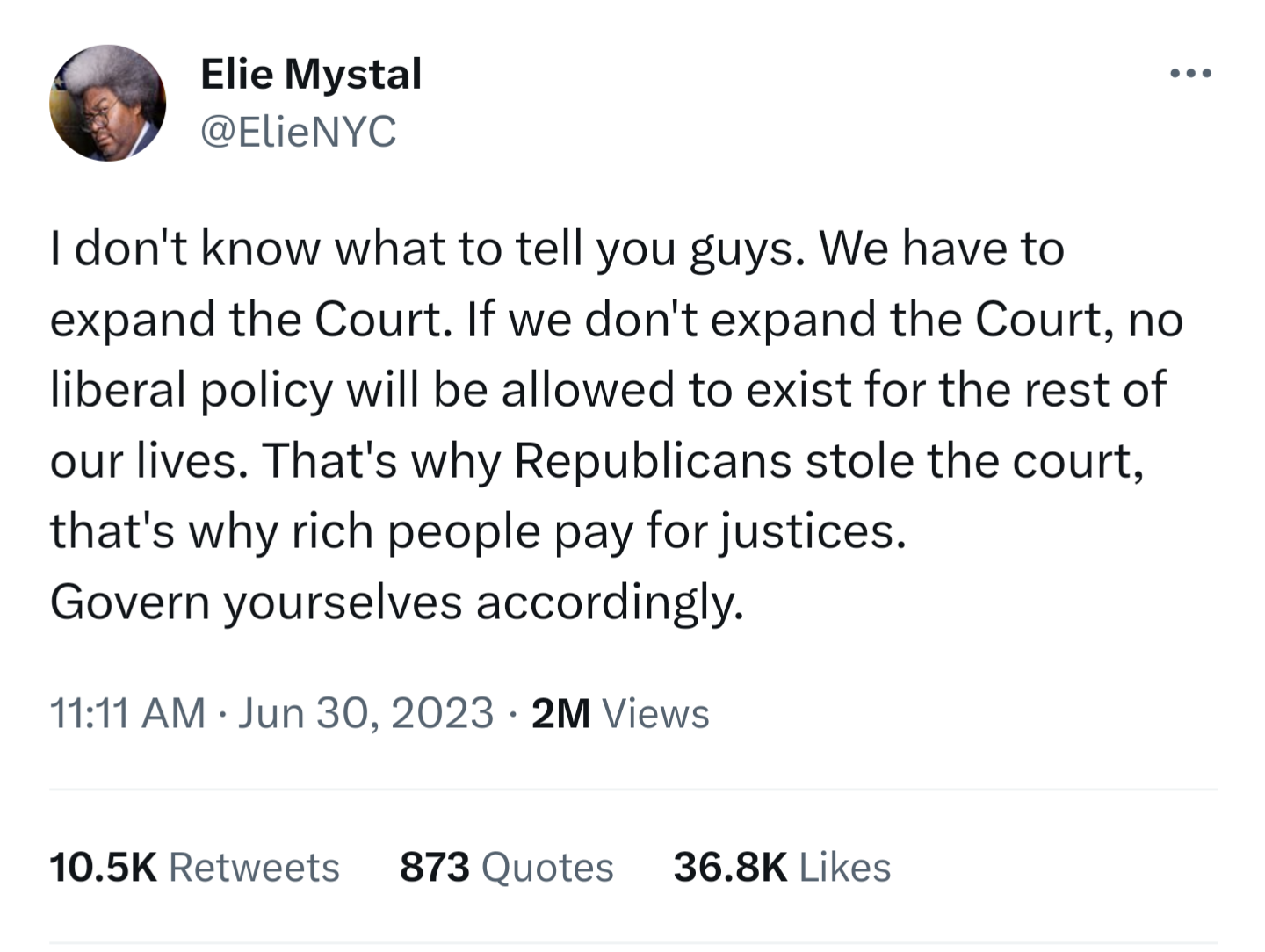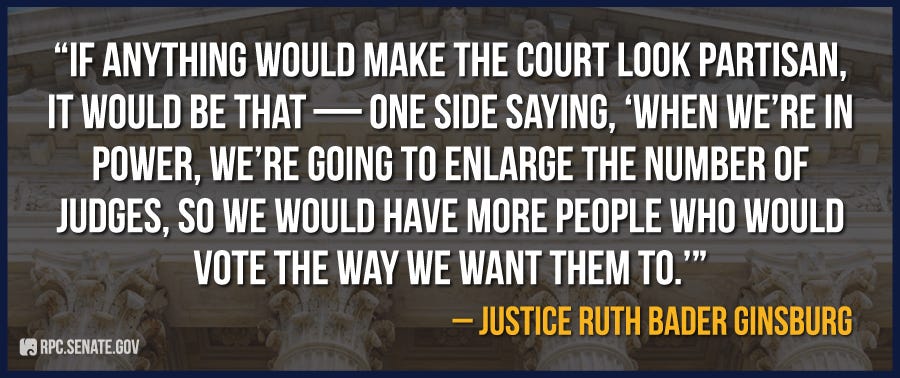The Left's War on the Supreme Court
There’s no greater threat to our form of government than attacks on the judiciary’s legitimacy.

It could not be any more clear at this point that Democrats have a double standard about which democratic institutions they want to protect. That’s the only reasonable conclusion one can draw after watching the assault by progressive activists and the Democrat-media complex against the Supreme Court. They’ve decided that because they lack ideological control over the Court, it must be delegitimized, and so they indulge in hysterical, hyperbolic ululations about the institution being on the brink of destruction because of a critical mass of Justices who try to hew to the Constitution.
From the New Deal to well past the Reagan era, progressives rightly regarded the Supreme Court as being safely on their side of the aisle. This was a period when they waxed poetic about the sanctity of what Alexander Hamilton famously called, in The Federalist No. 78, the “least dangerous” branch of the federal government. Of course, this was also an era when the Court’s liberal majority securely tended towards the expansion and centralization of federal government power or the passage of nationwide social legislation via judicial fiat. The Left defended the Court’s legitimacy because it was accomplishing progressive goals across the board and often with little regard for that silly Constitution, which they’ve long believed is past its sell-by date.
But when Reagan’s second term rolled around, progressives began to realize that their control of the Court wasn’t guaranteed forever, and so their attitude changed. They went on the defense and politicized confirmation battles, an ongoing chapter in our national politics that started with the infamous 1987 Robert Bork confirmation hearings and ultimately provoked a lasting partisan divide over judicial nominations. Today, it’s standard operating procedure for Republican Supreme Court nominees to be subjected to inquisitorial confirmations featuring invasive background checks while Democratic nominees breeze through with relatively minimum procedural fuss.
The tone of Left-wing commentary since the Court added its conservative majority has been apocalyptic. On December 16, 2021, an op-ed in the New York Times declared that the Supreme Court had been “weaponized,” its writer comparing the recent opinions to “a drone strike” and claiming that the “path of destruction of settled precedent and long-established norms is breathtaking.” As Senator Mike Lee points out in Saving Nine, such unhinged claims made in public about the Court quickly became the new normal, many of them linked to the fact that three Justices had been appointed by Trump, which according to some on the Left makes the Court illegitimate because the seats were “stolen.”
Now that Roe has been overturned, affirmative action has been outlawed, and Biden’s student loan grift1 has been shut down the hysteria has reached new heights.
The fact that progressives have gone on the offensive is a deeply ominous prospect for the country, considering the importance of judicial independence to the longevity of our “Great Experiment.” Their latest campaign to undermine the Supreme Court’s credibility has focused on charging Republican-appointed Justices with farcical allegations of ethics violations. Stories have rolled out almost daily from alternating outlets and journalists in an attempt to sow discord and paint the Court as an overwhelmingly partisan, bitter institution that must be addressed through emergency measures in order to “save democracy.” The seemingly deliberate drip-drip pace of these stories and the fact that they’ve neatly dovetailed with narratives promoted by richly bankrolled activist groups on the Left while perfectly coinciding with what Senate Democrats have been harping about suggests coordination.
ProPublica2 has published several dishonest pieces smearing Justices Thomas and Alito regarding trips they’ve taken. Citing “judicial ethics experts,” Alito is flatly accused of violating disclosure and recusal rules because he flew to Alaska in 2008 on a private jet owned by the billionaire hedge-fund manager Paul Singer. But Alito broke no such rules. At the time of the trip, the Justices were authoritatively advised that “personal hospitality” wasn’t reportable.3 The more serious allegation is that Alito should have recused himself from cases involving Singer’s various companies. ProPublica cites seven certiorari petitions to hear a case that the Court rejected. The case the Court accepted, regarding a dispute over Argentine debt, was decided 7-1 six years after the fishing trip. Alito’s recusal would’ve made no difference to the outcome.
Justice Thomas stands accused of having a wealthy friend — Harlan Crow, a conservative donor and philanthropist — who spent generously on joint vacations and other acts of family charity. As National Review highlights, this is a quid desperately grasping for a quo; Crow has never had any business before the Court. After conducting an exhaustive treasure hunt for a Crow-related case, the media only managed to find one that the Court declined to take involving a company so distantly related to Crow that the federal rules didn’t require the filings to disclose any connection.
The critics are careful to imply, but never to say, that these are “issues” unique to conservative Justices. They’re not. Not even close. Justices Ruth Baker Ginsburg and Stephen Breyer traveled frequently to Europe and other destinations for weeks at a time—all expenses covered. Between 2004-2021, Breyer went on 233 trips paid for by third parties. Ginsburg went on 157 such trips during the same time frame. No one batted an eye when Ginsburg accepted a trip with Israeli billionaire Morris Kahn in 2018 to three countries in the Middle East—a trip she listed as a reimbursement, and which came shortly after the Supreme Court issued a favorable ruling for Kahn’s company. Nor did anyone have a problem with Breyer flying on billionaire David Rubenstein’s plane in 2013 to attend a wedding in Nantucket, a trip which the Justice also listed as a reimbursement.
The fishing expedition for conflicts of interest is the latest angle in the progressive campaign to cripple the Court’s new majority. This focus on recusal is a serious gambit. Rather than Court-packing, it’s Court-thinning. By declaring even flimsy associations as reason for recusal, litigants can have certain Justices excluded from hearing a case. With only nine Justices on the Supreme Court, this could obviously determine outcomes, especially considering progressive logic holds that there’s no limiting principle for recusal, and that the grounds are whatever some activist group claims they are.
But should Justice Elena Kagan have recused herself from the Harvard affirmative action case because she’s a former Harvard law dean? Or how about Justice Ketanji Brown Jackson? Should she have recused herself from cases about executive power because she was essentially an affirmative action hire by Biden, to whom she must be thankful? These “appearances” of a conflict certainly seem more substantial than anything related to the Court’s conservative majority.4
This non-scandal about ethical impropriety5 that’s been ginned up by the media has coincided with a steady stream of accusations of partisanship and bias6 every time conservative Justices issue a decision out of step with progressive values. It’s become a disturbing trend for progressives to criticize opinions they disagree with as going beyond the proper role of the judiciary. The objective is to browbeat the Justices into ruling the Left’s way. But as this term’s slate of marquee cases has made clear, the Supreme Court’s majority won’t be intimidated.7
The Left’s Court-packing Scheme

There was a time not too long ago when packing the Court was a taboo idea. As late as 2018, even reliably Leftist thinkers wouldn’t get behind it. But things changed toward the tail end of the Trump administration. Activist groups like Demand Justice, Take Back the Court, and Indivisible began floating the idea of Court packing as a response to President Trump’s judicial nominations.
The idea went mainstream on the evening of September 29, 2020,8 when Biden met the former president on the debate stage for the first time less than two weeks after Ruth Bader Ginsburg had suddenly died. When moderator Chris Wallace asked Biden if he would support packing the Court, Biden danced around the question and gave several non-answers. This was when, after Trump pressed him on why he wouldn’t answer, Biden famously exclaimed, “Will you shut up, man!?”9
In April 2021, Democrats in the Senate and House introduced legislation to pack the Supreme Court by adding four new Justices.10 Why four? Because by the most amazing coincidence, there would then be seven Democrat-appointed Justices and six Republican-appointed Justices instead of the current 6-3 breakdown favoring Republican appointees. Democrats don’t seem to realize that a ruling party packing a nation’s highest court is a rare national embarrassment even in less developed countries. The U.S. would join the august ranks of hellhole Venezuela (2004) and Argentina (1989).
The Left’s politically motivated scheme to expand the Supreme Court is incredibly shortsighted. Obviously, what they’re trying to do is consolidate total power by imposing one-party rule over all branches of government, which they could then use as a cudgel against political opponents. But do they really not understand that, while a liberal wish list might be rammed through the Court in the short term, such a dramatic move would doubtlessly lead Republicans, when they next gain power, to escalate by adding more Justices, tilting the court back to a conservative majority? The Court would just grow bigger and bigger, turning into what Senator Mike Lee has described as a “political football,” with decisions made not based on text, precedence, and prudence, but only the priorities of the party in power.
And think about what would happen with “landmark” cases: They’d be decided and overturned every few years following each major electoral shift, removing the consistency and stability from our legal system. That consistency and stability give our system its reputation as the best in the world, free from political influence. It goes without saying that eroding that reputation by helming the federal judiciary with a political rubber-stamp Court would have a serious impact on America’s wider cultural and economic vitality.
If we were to suddenly convert the Supreme Court into a political body, it would not only remove the judiciary’s status as the last non-political branch of the federal government — one uniquely designed to offset the political passions of the day when they transgress constitutional limits — but the behavior of Justices would necessarily change. They’d come to see their duty as going beyond interpreting our laws, taking into account the political will of the president and the ruling party. The Court would become little more than a political tool of the executive and legislative branches. With Justices losing their ability to enforce the law with impartiality, the last safeguard to our civil liberties would be gone.
But many on the Left are more concerned about power than liberty, and are therefore trying to manipulate the Court to produce decisions serving their political interests. The multi-pronged offensive they’re waging couldn’t be more transparently ideological. It has nothing to do with ethics or genuine concerns about a “rogue” judiciary, and everything to do with the fact that the Left has lost control of the Court, which they had counted on for decades as a second legislature to impose their priorities when they couldn’t persuade Congress. Suddenly, instead of repeatedly approving the progressive agenda, the federal judiciary has become one of its greatest impediments. And progressives have decided that if they can’t get the results they like, they’ll do whatever it takes to burn down the institution’s public legitimacy.
The Founders went to great lengths to stress the importance of judicial independence to a vital republic. The bottom line is that the sanctity of our judiciary should never be subjected to political whims and pursuits. The Left’s grand scheme to delegitimize the Supreme Court, an institution that is part of the bedrock of our constitutional order, must not succeed.
Joe Biden in 2019: “But why should, in fact, these people out here pay for the fact that my kids had a significant debt, but they went to Yale and they went to Penn and they went – for incredibly high tuitions.” Biden’s failure to uphold his student loan forgiveness promise (which was always bound to be broken, and rightfully so) reminds me of the “Scott’s Tots” episode of The Office.
Worth pointing out that ProPublica, which describes itself as “nonpartisan” and “independent,” is funded by Left-wing billionaires like Herbert Sandler and George Soros who prefer a Supreme Court that engages in progressive judicial activism.
This spring the Judicial Conference, which is the governing body that implements the federal ethics law for the judiciary, changed its rules to note that judges should disclose trips taken on private jets. ProPublica, in citing this fact, admits that neither Alito nor Thomas broke any rules. ProPublica also fails to mention that these same allegations were submitted to the Judicial Conference by 20 members of Congress and two Left-wing groups in 2011. The Judicial Conference ruled that “no evidence had been presented” supporting the allegations.
There’s a long history of liberal and progressive judges finding implausible justifications to avoid recusal in hot-button cases.
Amazingly, many of the charges are coming from the same people who insist that it’s no big deal that the president’s family is receiving millions of dollars from Chinese and Ukrainian companies, routed through concealed shell accounts.
For example, Adam Schiff recently described SCOTUS as “a political and partisan court with a reactionary social agenda.” The sooner this moron is driven from office, the better.
Speaking of intimidation: In this post we won’t even be touching on the shameful period preceding the overturning of Roe, when the Left-wing group Ruth Sent Us published the addresses of the Justices and their homes were picketed around the clock. It’s because of these activist tools that the SCOTUS security detail has more than doubled in size to include 400 U.S. Marshalls.
Three days earlier, Trump followed through on his commitment to nominate a committed constitutional textualist to replace RBG—Judge Amy Coney Barrett. This sent the Left into paroxysms of rage.
To his credit, Biden recently said it’d be a mistake to expand the Supreme Court.









If the left were winning at the Supreme Court, they would be parroting in unison that we all must respect the rulings of the courts. For them, it's ALL about power. They want it, and the Court is standing in the way (for now.)
What would happen if the right enjoyed a long period of right-leaning Supreme Court decisions only to have long-standing precedents most thought would remain forever quickly toppled? Say for instance that a majority of ultra-liberal justices found a way to curtail gun ownership...well, maybe that's not possible but you get the idea: would conservatives be equally respectful of the court's decisions then? Maybe they would but I tend to think people are people, and on this issue the divide between right and left is not so great. Both sides respect the court when they're getting what they want.